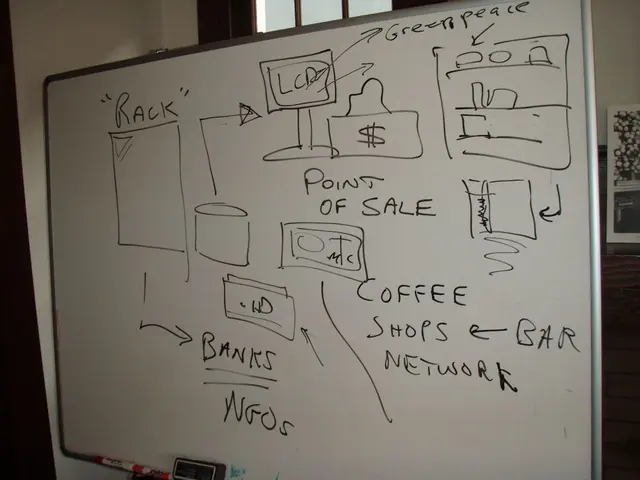Kazakhstan Pursues Strategic Advantages Amidst Tough U.S. Tariff Actions
In a move that stirred up the global trade scene, President Donald Trump announced an all-out trade war last week, adding mirror tariffs on nearly every nation, including Kazakhstan. Now, the Central Asian powerhouse has found itself smack dab in the middle of the chaos, facing a 27% tariff, the highest in its region. But fear not, according to experts, the impact on Kazakhstan could be negligible, even offering the potential for closer cooperation with the U.S.
The U.S. only represents 3% of Kazakhstan's foreign trade, and with around 85% of its exports to the U.S - including oil, uranium, and silver - being exempt, only 4.8% of the country's total exports to America will be affected. Yes, you read that right, that's a mere 4.8%. The Kazakh Ministry of Trade and Integration confirmed this in a statement released on April 3.
Expert Analysis: So What's the Big Deal?
We spoke to Kazakh and American experts to get their take on the potential ramifications of the new tariffs, set to take effect on April 9.
Darren Spinck, a research fellow at the Henry Jackson Society, a U.K.-based think tank, remained unphased by the tariffs, noting that only a small portion of Kazakhstan's total trade would be affected. "There's a silver lining here. From what I understand, only around 5% of non-energy or non-natural resource trade between Kazakhstan and the U.S. is subject to that 27% tariff. So that leaves considerable room for negotiation," Spinck said.
Independent financial analyst Andrey Chebotаrev echoed Spinck's sentiments. "These new tariffs won't really change much for us. About 80% of our exports fall under special provisions. If you look at the fine print of Trump's tariff order, oil, energy resources, rare earth metals, and ferroalloys are exempt. These make up the bulk of our exports," Chebotаrev explained.
Strategic Agreements: A Silver Lining?
Interestingly, with the vast majority of Kazakhstan's exports to the U.S - natural resources and energy - remaining unaffected, Spinck sees an opportunity. "If the U.S. and Kazakhstan reach an agreement, it could even pave the way for the U.S. Congress to grant Kazakhstan permanent normal trade relations. That would likely lead to more U.S. investment in Kazakhstan and Central Asia - particularly in infrastructure, the Middle Corridor, and the mining sector," he explained.
In other words, this could be a golden opportunity for Kazakhstan to lock in some long-term strategic partnerships with the U.S., potentially benefiting its economy in the long run.
No Shift Towards the EU Just Yet
So, will this set Kazakhstan down a path towards the EU? Not likely, according to Chebotаrev. "The EU is already our largest trading partner, and the U.S. doesn't rank among our top ten. I don't see any major shifts or reasons for concern." That being said, the EU has shown increasing interest in Central Asia, especially in light of recent developments.
The Global Impact: A Game of Chess with Geopolitical Consequences
The U.S.'s decision to impose tariffs isn't simply a protectionist move; it's part of a larger strategy to reshape global trade, global currency agreements, and North Atlantic trade. As Spinck highlighted, "Bond yields are dropping, meaning more demand for U.S. Treasuries. That leads to a lower U.S. debt level, which allows the Federal Reserve to cut interest rates. That reduces personal debt of American citizens and supports homeownership. There's a long game here, but most economic commentators only look at stock indexes - it's not a full picture of U.S. economic strength."
But the global economic consequences don't stop there. Increased protectionism could contribute to a global economic slowdown, reducing demand for raw materials. This could negatively impact energy-exporting nations like Kazakhstan by affecting volatile oil prices and overall business activity. Moreover, higher risk perception due to geopolitical tensions and protectionism might lead to decreased investment inflows into emerging markets, affecting growth prospects for countries like Kazakhstan.
Given the complexities of the global trade game, it's clear that the tariffs present both challenges and opportunities for Kazakhstan and its neighbors. The coming months will show how they navigate these turbulent waters.
[1] Information in this article is based on available data as of 2024, and does not represent current or future trends or predictions.[2] Enrichment Data: Overall, this situation could lead to countries like Kazakhstan seeking to diversify their trade partnerships, contribute to a global economic slowdown, decrease investment inflows to emerging markets, enhance regional cooperation, shift global influence, and lead to strategic realignments, affecting traditional relationships and creating new global power dynamics.
- The tariffs announced by President Trump will mainly affect only about 4.8% of Kazakhstan's total exports to the U.S, as most of its exports - including oil, uranium, and silver - are exempt from the 27% tariff.
- Darren Spinck, a research fellow at the Henry Jackson Society, finds a silver lining in the high tariffs, stating that only around 5% of non-energy or non-natural resource trade between Kazakhstan and the U.S. is subject to the 27% tariff, leaving ample room for negotiation.
- Andrey Chebotаrev, an independent financial analyst, agrees that these new tariffs won't significantly change Kazakhstan's trade with the U.S, as about 80% of its exports fall under special provisions and tariff exemptions, like those for oil, energy resources, rare earth metals, and ferroalloys.
- Darren Spinck, by observing the unaffected majority of Kazakhstan's exports to the U.S, believes that this tariff situation presents a chance for establishing long-term strategic partnerships with the U.S, which could potentially benefit the Kazakh economy in the long run.






